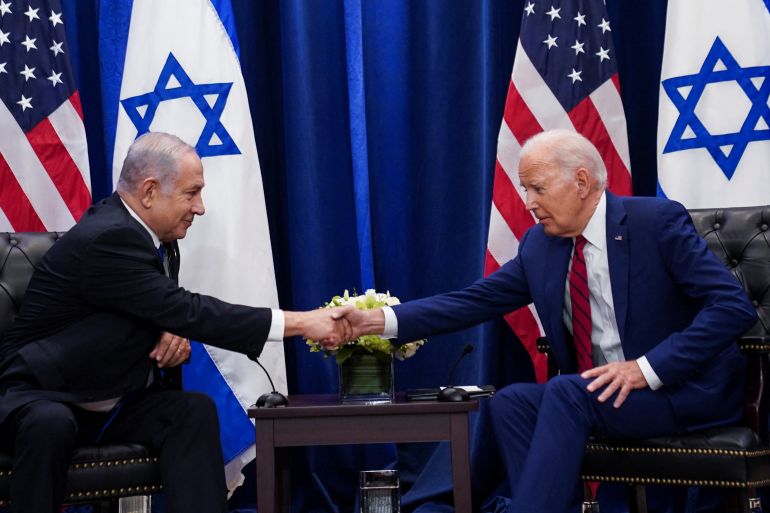White House says the leaders discussed confrontation with Iran in 30-minute conversation that included Kamala Harris.

Washington, DC – United States President Joe Biden has reaffirmed his “ironclad” support for Israel during a phone call with Prime Minister Benjamin Netanyahu, the White House says, amid an escalation of violence in Gaza and Lebanon.
The call between the two leaders on Wednesday lasted 30 minutes and was their first publicly announced conversation since August.
The White House said in a statement that Vice President Kamala Harris, who is running to succeed him in the US presidential election next month, joined the call.
“The president affirmed his ironclad commitment to Israel’s security,” it added. “He condemned unequivocally Iran’s ballistic missile attack against Israel on October 1.”
White House spokeswoman Karine Jean-Pierre had described the talks as “direct” and “productive”.
The call was made as Israel considers an attack against Iran in response to the ballistic missile launches that targeted Israeli military sites last week.
Jean-Pierre said Biden and Netanyahu had “discussions” about the confrontation with Iran without providing further details.
Iran fired a barrage of missiles at Israeli bases last week in an assault that it said was in retaliation for the killing of Hamas chief Ismail Haniyeh in Tehran and the assassination of Hezbollah leader Hassan Nasrallah alongside an Iranian general in Beirut.
The US administration pledged to ensure “severe consequences” for Iran over the attack.
Asked after the missile attack whether he would support an Israeli strike on Iran’s nuclear facilities, Biden said: “The answer is no.”
The US president also suggested that Washington opposes bombing Iran’s oilfields.
“The Israelis have not concluded what they are going to do. That’s under discussion,” he told reporters on Friday.
“If I were in their shoes, I would be thinking about other alternatives than striking Iranian oilfields.”
Such an attack would send oil prices soaring across the world, which could prove costly for Harris ahead of the elections.
The US has provided unconditional military and diplomatic support for Israel since the outbreak of the war on Gaza – a policy that Harris has promised to maintain.
While Washington has warned against expanding the war, the Biden administration says it is in favour of the Israeli offensive in Lebanon, which has killed more than 2,000 people and displaced over one million others, as well as the invasion of the in the country.
The White House said on Wednesday that Biden emphasised the need for a “diplomatic solution” to the crisis in Lebanon.
But a day earlier, the US State Department suggested that Washington is no longer seeking a ceasefire between Israel and Hezbollah because the Lebanese group is “on the back foot”.
On Wednesday, the Biden administration also expressed concerns for civilians in Lebanon, echoed its previous statement about Palestinians in Gaza.
“The president affirmed Israel’s right to protect its citizens from Hezbollah, which has fired thousands of missiles and rockets into Israel over the past year alone, while emphasizing the need to minimize harm to civilians, in particular in the densely populated areas of Beirut,” the White House said.
On Tuesday, Netanyahu warned the Lebanese people that if they do not turn against Hezbollah, their country would face a “long war that will lead to destruction and suffering like we see in Gaza”.
Israel has killed more than 42,000 Palestinians in the besieged Palestinian territory, where it has levelled entire residential areas and imposed severe restrictions on humanitarian aid, bringing the enclave to the verge of famine.
US Department of State spokesperson Matthew Miller warned that there “should be no kind of military action in Lebanon that looks anything like Gaza”.
But parts of southern and eastern Lebanon and the southern Beirut suburb of Dahiyeh are already seeing widespread destruction due to Israeli bombardments.
As the war expands in Lebanon, Israel has been pushing on with its campaign in Gaza, where Palestinian rights advocates are accusing it of carrying out an ethnic cleansing campaign in the north of the territory by withholding aid and shutting centres sheltering civilians.
On Wednesday, Miller expressed concern about possible abuses in Gaza.
“We have been making clear to the government of Israel that they have an obligation under international humanitarian law to allow food and water and other needed humanitarian assistance to make it into all parts of Gaza, and we fully expect them to comply with those obligations,” he said.
The US provides Israel at least $3.8bn in military aid annually, and the Biden administration has authorised $14bn in further assistance to help fund the ongoing war.